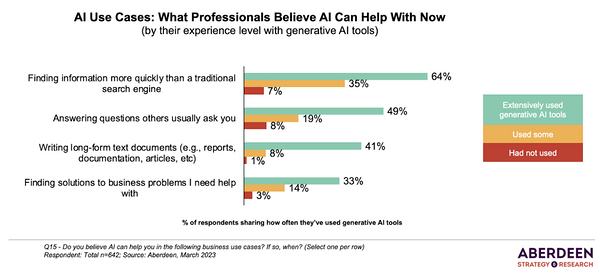In April 2021, Pager, a nine-year-old macaque monkey, successfully played a game of Pong with its mind using Neuralink technology.
Some six hours ago (at the time of writing), the news about Neuralink’s successful human implantation of wireless brain chips broke out. It stated that their product called Telepathy, a wireless brain chip that would enable “control of your phone or computer, and through them almost any device, just by thinking.”
It’s official. Telepathy is real.
And much like this type of mind reading does work, another kind of technology is reading our minds every day.
AI in Search Engines
Artificial intelligence allows modern search engines to understand user intent and has advanced so much that it now feels like digital telepathy.
AI in search engines used for semantic and predictive search enables analysis of vast datasets, predicting user intentions through neural networks and natural language processing. This data and technology are then used for user intent recognition to enhance search engine responsiveness via search algorithms.
According to a recent research conducted by Aberdeen Strategy and Research group, 64% of business professionals said they “extensively used” AI in search engines to find answers and data more quickly than a traditional search engine.

This number is likely going up as we speak as AI-driven search engines continue to beat traditional search technology, especially in terms of understanding user intent.
Understanding User Intent Recognition
Traditional search engines relied heavily on keyword matching to deliver relevant results.
However, AI in search engines improves comprehension of user intent and makes it more accurate. According to a study by Search Engine Land, user intent recognition now plays a pivotal role in shaping AI-driven search results in major search engines like Google and Bing.
Their research found that Artificial Intelligence and search algorithms have significantly improved personalization and relevant search experience.
Data from this study revealed that AI in search engines can now understand the context behind queries, enabling them to provide more nuanced and targeted results to website visitors. This shift in focus from keywords to intent and predictive search improves the user experience and increasingly resembles mind reading.
Semantic Search and Natural Language Processing
One of the key ways AI is revolutionizing predictive search and overall search engine capabilities is through semantic search, wordless search, and natural language processing (NLP).

A report by Statista reveals that the integration of NLP and AI in search engines has led to a powerful improvement in understanding human language in much more detail. This is crucial for deciphering the context, tone, and sentiment behind search queries.
In practice, this means that search engines can now deliver more accurate and contextually relevant results.
For instance, NLP and AI in search engines can now tell the difference between a query for “best running shoes” and “best running shoes for flat feet,” tailoring AI-driven search results to specific user needs – something that is incredibly important for e-commerce businesses.
Personalization Through ML, Predictive Search, and User Intent Recognition

Machine Learning search algorithms and AI in search engines have played a pivotal role in enhancing the personalization of e-commerce search results.
Recent data from a study by Research Gate says that AI-powered personalization significantly influences user satisfaction with search engines. ML models analyze customer behavior, preferences, and historical search data to tailor results based on individual profiles.
By understanding individual preferences, search engines equipped with predictive search and visual AI technologies effectively read minds and can anticipate user needs before they even articulate them.
This is incredibly vital for e-commerce platforms as implementing these technologies into their e-commerce search engines can enhance and speed up customer journeys and vastly improve sales.
How Mind Reading via AI in Search Engines is Critical for E-Commerce
The takeaway for online retailers is that they need to implement new AI-driven technologies that enable mind-reading of their customers’ intent. Not only will this vastly enhance the buying journey for their shoppers, but it will also, in turn, boost their e-commerce ROI.
When you improve and speed up product discovery on your e-commerce platform, your customers feel like they have a personal shopping assistant who can read their minds.
Perhaps the best example of this is visual AI product discovery tools that use ML and predictive search to improve user intent recognition. These tools understand what is in the product photos that the shoppers click on and then recommend actually similar products that match their style and intent.
Shoppers can’t always accurately describe the product they want using only keywords, while the search filters often do the opposite of helping, which is quite common in the fashion industry.
Visual AI tools solve these problems that are slowing down your sales by helping your customers discover precisely the products they want in under 60 seconds. The shoppers get a TikTok-like shopping experience that is fun and engaging, and your e-commerce business makes more money by improving customer journeys.
Boost Your E-Commerce With Miros.ai
Miros.ai is a wordless search tool based on visual AI and photo search solutions. It helps your shoppers get exactly the products they want quickly and without the hassle of using too many keywords.
It’s like mind-reading search magic. Here’s a quick example of how it works:
Imagine a shopping experience as addictive and fun as social media platforms like TikTok or Pinterest. It will help you improve your e-commerce business revenue while at the same time getting rid of the following:
- Slow, text-based search for your shoppers
- Cookies
- Extensive metadata optimization
We work with platforms from various industries, including:
Our clients experience immediate KPI boosts. Momox, for example, improved its GMV by 19%, AOV by 11%, and ARPU by 10%.
Want to get similar increases in your own KPIs? Book a quick demo with the Miros team and learn how we can help your e-commerce platform skyrocket.




